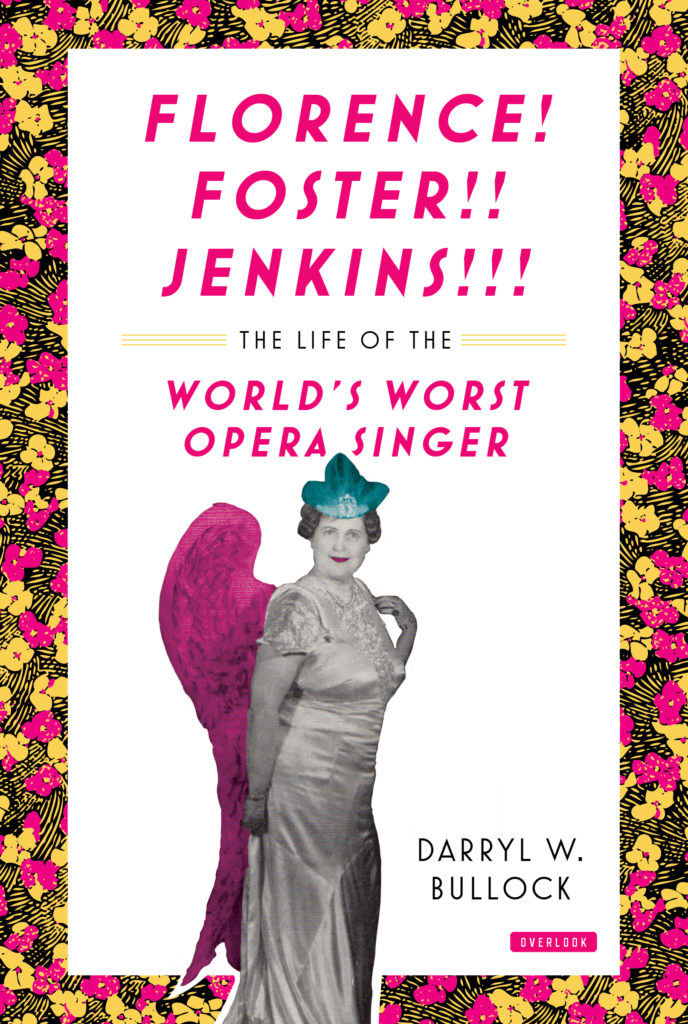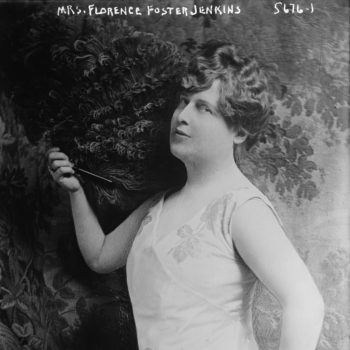Each week in chattering class we’re schooled by an expert in some party-worthy topic. This week our topic is “the worst opera singer ever.” And our expert is a purveyor of fine, bad music author Darryl W. Bullock. He wrote “The World’s Worst Records, Volume One and Two.” And his new book’s a biography called “Florence! Foster!! Jenkins!!!”
Florence was an eccentric and beloved New York socialite who, in the 1900s, insisted on singing opera classics… stupendously badly. She became a local celebrity, and eventually, an international phenomenon.
Next month Meryl Streep stars in a biopic about her.
Below, Darryl what Florence’s appeal was to the masses and whether she was aware of just how terrible she was. Bonus: You can check out Darryl’s picks for worst albums of all time here.
Interview Highlights:
On the reviews of Florence’s singing by critics
Darryl W. Bullock: Well, there’s certainly a famous Billboard quote that says, “listening to her sounded like listening in [on] a padded cell inmate.” And there’s also many kind of references to the kind of hoots, and screeches, and swoops, and everything else of her vocal gymnastics, if you like…. She had a certain abandon about her when she performed. Should we say that.
She actually had talent in music… just not as a singer
She was a trained pianist. She played piano for at least two Presidents. She played at the White House twice.She played and she sang in the choir at the White House. She was a very good pianist, and when she first moved to New York, she first performed as a pianist, before she even thought about singing publicly.
She was a patron [of the arts]. She raised a lot of money for different causes but she also used a lot of her own money to further the careers of other artists. [Arturo] Toscanini, a very famous one. She helped bankroll his performances. She was very, very into people of [Giuseppe] Verdi that she formed a club called “The Verdi Club,” specifically to promote his music in America.
So, why did she focus so intently on one of the few things she was not good at (i.e., singing)?
Well, there are different ideas about why this might have happened. My personal opinion is she probably could sing OK, as part of a choir. Certainly as part of a chorale, which is where she first, how she first started performing in New York in the 1910s, 1911s. She was probably perfectly acceptable, but it was once she got out on her own, that she really wasn’t good enough.
I think she was absolutely dedicated in what she did and she was absolutely resolute that she was going to do this no matter what. And she was very good at ignoring people who told her she wasn’t very good.
On whether she was in on the joke

I think she knew that some people took her as a joke. I don’t think there’s any question that she famously kept her clippings, her press cuttings. She knew for years before she died that people were coming to her shows, to her concerts, most of which were given in very small venues and only to select people, but she knew people were coming to laugh.
I don’t think she minded that much to be honest. I think as long as there were friends around her that supported her, that believed in her, that would kind of give her the, the “oomph” she needed to get up and go, everybody else was kind of… she didn’t mind. They were having fun, that they were enjoying something.
And I think — also if you think about this — most of the performances that we talk about, we know about in the recordings of it made and all this kind of thing happened on the cusp of and during the Second World War when, you know, people needed cheering up.
Just how famous was she?
Well, she was only famous in New York because, unfortunately, all of the recordings she made were only available on the kind of very limited numbers and only pressed and sold around the New York area. So it was only after she died that she took on the Cult of Florence, in the 1950s, once her records were reissued by RCA.
Eight of the nine existing recordings on a 10-inch album went straight into the classical charts and Billboards and stayed there for years. The record has never been out of press.
That record, since 1954, has never been unavailable. It’s always been there. Can you think of any other record that, for the best part of 70 years, is still available somewhere? You can still grab and buy it today.
On the famously bad singers who predated Florence
I mean, we can go right back to the beginning of the 1900s, and you had the famous vaudeville acting estates called, The Cherry Sisters, who were just absolutely appalling. And, and there were tons of newspapers reports about how bad their act was. Everything from vegetables to live chickens to a washing machine or a washing tub was thrown at them at the stage because they were so awful.
![See page for author [Public domain], via Wikimedia Commons](../wp-content/uploads/2016/07/The_Cherry_Sisters_-_Three_of_the_siblings_strike_a_theatrical_pose._01.jpg)
But the thing with Florence is she was the first to, well, certainly one of the earliest, to record. She put it out there. And you’ve got to love her for doing that.
Where does Florence rank on the worst singers of all time?
Well, this whole thing with parts in the book started because I did an earlier book called, “The World’s Worst Records,” and I tried to do that in a kind of chronological order, so she was the first person I mentioned.
I think Florence’s recorded output is amongst the best worst music ever. You know, I love bad music, but it has to be something that’s created by someone who’s sincere. I’m not really into novelty music and I like stuff that’s been created by someone who really wanted to perform and produce and create something that they thought was art.
On the appeal of terrible music
It’s funny, certainly. It’s very funny. But there’s a genuineness to it. There’s a real kind of hearthness and emotion behind good music and bad music. If there’s emotion in it, if there’s a genuine need to create, then I think it’s valid.


